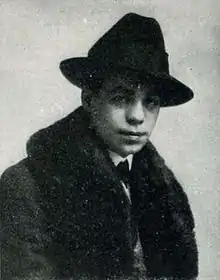Harry Carroll
Harry Carroll (November 28, 1892, in Atlantic City, New Jersey – December 26, 1962, in Santa Barbara California) was an American songwriter, pianist, and composer.
Harry Carroll | |
|---|---|
 Carroll in 1919 | |
| Background information | |
| Born | November 28, 1892 Atlantic City, New Jersey, United States |
| Died | December 26, 1962 (aged 70) [Santa Barbara California], United States |
| Occupation(s) | Songwriter, pianist, composer |
| Instrument(s) | Piano |
Biography
Carroll taught himself how to play the piano and began playing in movie houses before he finished grade school.[1] After he graduated from high school, he moved to Pittsburgh PA and then New York City, where he worked as an arranger in Tin Pan Alley and at night entertained at the Garden Café and accompanied various vaudeville shows. He contributed the song (lyric by Ballard MacDonald) "Nix on the Glow Worm, Lena" to the Ziegfeld Follies of 1910.[2]
In 1912, Carroll was hired by the Schubert brothers' Winter Garden productions as a contract writer. He worked with Arthur Fields to produce his first hit, On the Mississippi. In 1913 he again collaborated with Ballard MacDonald on the big hit song "The Trail of the Lonesome Pine."[3] He wrote several Broadway stage scores including some popular favorites: "I'm Always Chasing Rainbows" (based on a section of Fantaisie-Impromptu by Frédéric Chopin), "By the Beautiful Sea" and "There's a Girl in the Heart of Maryland."[4] Harry Carroll toured with vaudeville star Anna Wheaton for many years during this time.[5]
Harry Carroll served as the director of ASCAP from 1914 to 1917. He later moved west to Los Angeles and became involved in early movies.
Personal
Carroll's first marriage to Radio City Rockette, Estelle Cooper in 1921 ended in divorce in 1934.[6]
Carroll's second marriage was to singer and dancer Pauline Baker (b. circa 1912, d. before 2011).[7] They had two children, Harriett (b. circa 1932, d. before 2011) and Pauline ("Polly") (1934-2011).[8] Harry and Pauline Carroll performed in Las Vegas and toured in the 1940s[9] and together wrote "Say When," a song which Pauline introduced at Grace Hayes Lodge in the San Fernando Valley[10] and was featured in Blackouts of 1942.[11]
Death
He died on December 26, 1962, in Santa Barbara California,[12] survived by his second wife and 2 daughters and numerous grandchildren.
Legacy
In 1970, eight years after his death, Carroll was inducted into the Songwriters Hall of Fame. He is the only composer with two songs in the Hall of Fame's list of the Top 100 popular songs.[13]
References
- Songwriters Hall of Fame - Harry Carroll Exhibit Home
- www.ibdb.com http://www.ibdb.com/Production/View/4962. Retrieved 2015-10-15.
{{cite web}}: Missing or empty|title=(help) - Harry Carroll Is Dead, Wrote Many Song Hits, The New York Times, December 28, 1962
- The ASCAP Biographical Dictionary, edited by Daniel McNamara, Thomas Crowell Company, New York, 1952
- Soren, David (2021). "Harry Carroll: Always Chasing Rainbows". The American Vaudeville Museum and UA Collection, University Of Arizona. Retrieved September 5, 2021.
- Soren, David. "Ibid".
- Harry and Pauline Carroll and their children in the 1940 Census. https://www.ancestry.com/1940-census/usa/California/Pauline-Carroll_2kvdqk
- Pauline 'Polly' Merriman (Carroll) https://obits.oregonlive.com/us/obituaries/oregon/name/pauline-merriman-obituary?pid=152615903
- "Harry Carroll Is Dead, Wrote Many Song Hits". The New York Times. December 28, 1962. Retrieved September 5, 2021.
- Carroll, Harry and Pauline (1941). Say When [Sheet Music]. North Hollywood, CA: Carroll-Hayes Music Publishers.
- Bloom, Ken (1996). American Song: The Complete Musical Theatre Companion. New York: Schirmer Books. p. 112. ISBN 0-02-864573-1.
- "Harry Carroll | Songwriters Hall of Fame".
- Harry Carroll (I) – Biography
External links
- Harry Carroll at the Internet Broadway Database
- Harry Carroll recordings at the Discography of American Historical Recordings.
- Harry Carroll papers at the University of Oregon